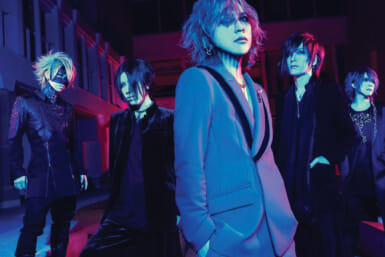One of very few bonuses of having had almost an entire year lost to the pandemic is that it’s allowed more time for listening to music – even if musicians and the networks around them have desperately struggled. Working and studying from home, there’s been more time for lockdown albums and virtual concerts – and especially the TW Live House series.
Of the just over 300 new Japanese albums, live albums, EPs and compilations that I somehow managed to get my ears to in 2020, here are the ones that made the most significant lasting impressions – the ones I keep returning to, and that I’m likely to keep on loving in the years ahead.
10. Mei Ehara, ‘Ampersands’
(Kakubarhythm)
The professional loveliness of Mei Ehara’s Ampersands was irresistible. Following Sway, Ehara’s 2017 debut (not including her home folk recordings under may.e), she rolled out a new band with an almost entirely new batch of tracks. Each one was a welcome break of pace; plush and smooth with solid songwriting and effective production – the latter two features managed by Ehara herself.
Ampersands also fitted nicely as an end piece for the last decade’s city pop revival. Widely-influenced and distinctly urban, it pushed past revival and imitation into a sound that was distinctly its own. Cozy, detailed and elegant proof that easy-listening music doesn’t have to be mundane or sluggish – it can be expert and accomplished, too.
9. Ichiko Aoba, ‘Adan no Kaze’ (2020)
(Hermine)
Throughout almost the entirety of 2020, Ichiko Aoba had her fans on tenterhooks. Following the January release of two singles “Amuletum” and “Bouquet,” and April’s live album “Gift” at Sogetsu Hall, the months drifted by and a studio album looked increasingly unlikely. Until, that is, December and Adan no Kaze (Windswept Adan).
A “soundtrack to fictitious movies,” Adan no Kaze mixed Aoba’s usual meld of old and new folk arrangements with swarming field recordings, ambient billows and blissful New Age electronics. Despite being moored by Aoba’s songwriting and stripped-back façade, the arrangements and compositions of Taro Umebayashi elevated the work to a scale unseen on previous Aoba projects.
As such, Adan no Kaze easily demonstrated Aoba’s most significant and ambitious musical advancement so far. It couldn’t have been any more worth the wait.
8. Sunny Day Service, ‘Iine!’
(Rose Records)
To say that Iine! (or Like!) was Sunny Day Service’s second wind does a slight disservice to the consistency of their output over the last two and a half decades. But Iine! was also just that good. Simple pop-rock with little more than guitar, bass and drums, it harked back to the neo-acoustic pop style of Shibuya-kei that first shot Sunny Day Service to fame.
Nine positive, energetic tracks with tons of catchy, singalong vocal melodies, Iine! was a refreshing change from the doom and gloom of the world outside of earphones – in its quality, as well as its style. It sat apart from current trends: evidence of the timelessness of simple, well-written, well-performed pop-rock.
7. Yano et Agatsuma, ‘Asteroid and Butterfly’
(JVCKENWOODVICTOR)
Art-popstar Akiko Yano and shamisen specialist Hiromitsu Agatsuma’s Asteroid and Butterfly spawned from a collaborative track on Yano’s 2018 album Futari Bocchi de Ikou. Some songs here reimagined traditional Japanese folk tunes in a contemporary style, while others rerecorded some of the duo’s more modern tracks with a traditional tinge.
And Yano and Agatsuma got the balance just right. Modern effects and instruments were applied subtly, while more obvious additions like English hooks and driving beats were always tasteful. Throughout, Asteroid and Butterfly pedestalled the innovation and versatility of two magnificently talented artists – an exemplary model of bold and innovative collaboration.
6. Phew, ‘Vertigo KO’
(Disciples)
Billed as a compilation of tracks leftover from Phew’s previous two records (Light Sleep and Voice Hardcore) plus some new additions, Vertigo KO managed to be just as gripping and cohesive as most artists’ primary product.
As usual for Phew, Vertigo KO straddled both the more approachable and testing poles of experimental music. Lots of her phases were clearly, openly pretty, with reaching drones, dozens of layers of a cappella and analogue synths. Other times, she was more abrasive and skeletal, too restless to dwell on any nostalgia suggested by her mechanical synthesisers tones.
Vertigo KO was more mobile and unstable than most records in a similar drone and electronica bracket – but that variation was its draw. Like an extension of Phew’s punk origins, Vertigo KO prioritized musical expression, no matter the form.
5. Yoshida Ichiro Untouchable, ‘Epithesi’
(Self-released/Petastereo)
When Ichiro Yoshida’s Epithesi hit one of its many peaks, there was little else quite like it. Slinky synthpop with nods to sophisti-pop, electronica and new wave, it built upon Yoshida’s 2015 solo debut Apanda with greater drama, catchier melodies and some astronomic highlights.
Yoshida is likely known to most as the ex-bassist of Zazen Boys, but Epithesi shared little common ground with the Japanese post-hardcore legends. It was glitzy and sheening, a crisply produced crossover of accessible pop and more ambitious, stranger things. At the heart of that strangeness was Yoshida’s singing. Around oft-absurd lyrics, Yoshida sagely bellowed in a manner that felt somewhat messianic and, occasionally, even terrifying.
On the many occasions throughout Epithesi that combined ramped-up drum machines, winding synth melodies and Yoshida’s bass roar, it became dramatic, captivating and, indeed, untouchable.
4. Tendre, ‘Life Less Lonely’
(Rallye)
Heralded by a slew of singles, collaborations and production features, Life Less Lonely was the peak of a busy 2020 for singer, songwriter and multi-instrumentalist Tendre (Taro Kawahara). In the two years between his debut Not In Almighty and this, Kawahara grew into one of the most in-demand Japanese pop producers around – Life Less Lonely celebrated that, in a variety of ways.
At its core was the Tendre sound, grown and consolidated. Kawahara has gradually made a certain blend of hip hop, pop soul and sophisti-pop his own: collaborators and melancholic cuts alike were subdued by the swallowing luxury and powerful optimism of his signature sound – Life Less Lonely was a pop soul masterclass.
3. Kensuke Ide and His Mothership, ‘Contact From Exne Kedy and the Poltergeists’
(P-VINE)
Having the ambition to attempt a concept album is one challenge: it’s another entirely to make it captivating, memorable, and, above all, musically substantial. Kensuke Ide’s second album Contact From Exne Kedy and the Poltergeists, however, achieved it all.
Rooted in the strut and theatrics of 1970s British glam rock icons T-Rex and David Bowie (the latter, it appears, even down to a ‘starman’, Ziggy Stardust-esque protagonist), Ide left his old, folky sound in his dust. His new “mothership” of musicians included the likes of mmm and Mei Ehara, putting together a particularly starry, cinematic psych rock sound.
The concept, meanwhile, took us through the surreal interactions an alien, Exne Kedy. While it’s easy to read too much into Ide’s lyrics, in a year like this one, those situations managed to resonate with a very human sense of alienation.
2. Chelmico, ‘Maze’
(unBORDE)
As Chelmico’s Maze churned out hit after hit, the obstinate catchiness of every track (even the less-upbeat ones) threatened to become a bit ridiculous. As well as big hits like “Easy Breezy,” “Limit” and “Disco (bad dance doesn’t matter)”, the deep cuts of Maze also showed MCs Rachel and Mamiko perfect their knack for making pop-rap earworms.
And that knack was bolstered by the amount of variety displayed through Chelmico’s beats. Tons of influences, from drum ‘n’ bass to ska, were piled into a raucous mix that leapt between styles. Yet somehow, instead of coming across as dislocated or clumsy, Maze just dazzled; and curated its own world of inventive, characterful pop.
1. Gezan, ‘Klue’
(13th Records)
Combining raw rock experimentation with an anarchic, potent call to arms, Gezan’s Klue (or Madness) spent all year entrenching itself as one of the year’s most essential Japanese rock albums.
Escalating Gezan’s return to abrasiveness on 2018’s Silence Will Speak, Klue mixed noise rock and post-hardcore with bits of dub, industrial rock and psychedelia. The results were wild and intense, unlike any previous Gezan release – indeed, unlike any other rock record in 2020.
“Revolution and sensation towards dawn,” claimed Klue’s liner notes – if said sensation was in Gezan’s instrumentals, the revolution lay in the lyrics. Lead singer MahiTo ThePeople’s screams, growls and squeaks were unflinchingly political. Riling against passive complicity in violence, discrimination and inequality, MahiTo laid bare his potent criticisms of Japanese society.
Every element of Klue made for necessary listening: eleven months and a pandemic later, its bite holds firm.
Ed Cunningham is editor of The Glow, a site that promotes Japanese music to English-speaking audiences









